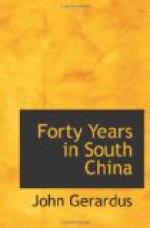(which is very rare in this part of China), they are
imposed to secure merit, not to atone for sin.
I do not remember ever to have met with an individual
among the Chinese who had any sense of sinfulness
of heart, or even any remorse for sinfulness of conduct
except he was first taught it by the Gospel. It
is one of the most difficult truths to convey to their
minds that they are sinners against God. We have
had a few inquirers who have expressed a deep sense
of sinfulness. But this sense of sinfulness has
come from hearing the Gospel. The way the most
of those, whom we doubt not are true Christians, have
been led on seems to be as follows: They hear
the Gospel, presently they become convinced of its
truth. Their first impulses then seem to be those
of joy and gratitude. They are like men who were
born blind, and had never mourned over their blindness,
because they had no notion of the blessing of sight.
Presently their eyes begin to be opened and they begin
to see. They only think of the new blessings which
they are receiving, not of the imperfections which
still remain in their vision. A sense of these
comes afterwards. Was not this sometimes the case
in the days of the apostles? It was not so on
the day of Pentecost. The multitude were ‘pricked
in their hearts’ because the moment they were
convinced that Jesus was the Christ they were filled
with a sense of their wickedness in crucifying Him.
So it is with persons in Christian lands when their
minds become interested in the truth; they are made
to feel their wickedness in so long resisting its
influences. But the case seems to have been different
when Philip first carried the Gospel to Samaria.
The first effect there seems to have been that of
‘great joy.’
“It seems to be thus in Amoy. The conviction
of deep sinfulness comes by meditating on the Gospel,
the work of Christ, etc.
“It is the doctrine of the cross of Christ,
after all, which should be the theme of our discourses.”
March 18, 1851. To his brother, Goyn.
“They say in regard to preaching, that when
a man has nothing more to say he had better stop.
If this rule were carried out in conversation and
letter-writing, there would be much less said and written
in the world, than is now the case.
“You seem to think that we missionaries can
sit down at any time and write letters, always having
enough matter that will be interesting to you at home.
This is a good theory enough, but facts do not always
bear it out.
“Our missionary work moves on usually in the
same steady manner without many ups and downs or interesting
episodes (rather a mixture of figures you will say),
which we think worthy of note. I wish you folks
at home could send us more men to drive on the work
a little faster. The door of access at Amoy still
continues as wide open as ever, and now seems to be
the time for the Church to send her men and occupy
the post, which the Master offers to her. But
the Church at home cannot, it seems, look at this matter
as we who are on the ground....




